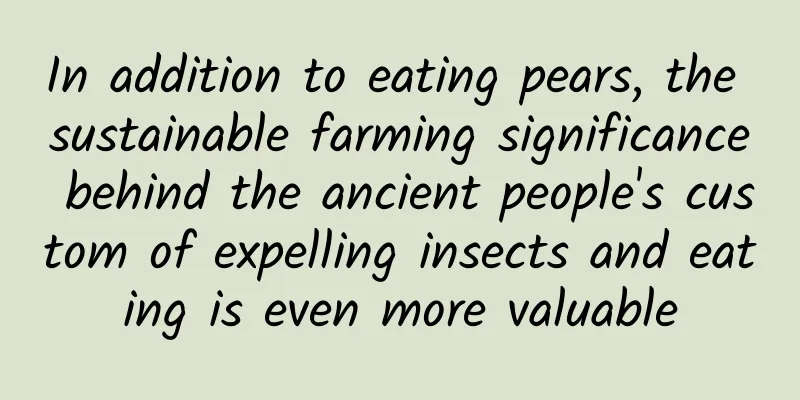In addition to eating pears, the sustainable farming significance behind the ancient people's custom of expelling insects and eating is even more valuable

|
"Watching the Farmers" is a poem written by Wei Yingwu, a pastoral poet from Xi'an in the Tang Dynasty, which depicts the busy farming scene during the Jingzhe season. For the Chinese, who are an agricultural civilization, Jingzhe means the birth of all things and the sowing of hope. However, if you want to have a full granary in autumn, in addition to hard work, you also need to be on guard against the impact of "pests" on crops at any time. Jingzhe, also known as "Qi Zhe", is the third solar term in the 24 solar terms. It falls on March 5-6 of the Gregorian calendar every year. Jingzhe reflects the phenomenon that natural organisms sprout and grow due to changes in rhythm. As for the origin of the name Jingzhe, the "Collection of Explanations of the Seventy-two Seasons of the Lunar Calendar" says: "In the second month...all things come out of the shock, which is thunder, so it is called Jingzhe, because hibernating insects are startled and run away." The perspective of the ancients has always been more figurative. They summarized and refined natural phenomena into "eight images" and represented them with binary symbols, thus forming the Eight Trigrams, which were reluctantly named "Yi". They constitute the philosophical root of all Chinese traditional culture, and are used to explain the heavens, the earth, and all things in the world in the eyes of the Chinese, and to guide people's behavior, thus forming the cultural core of Chinese customs. Jingzhe is the embodiment of this simple materialistic philosophy. During this time, the ancients heard thunder in the sky and saw insects dormant in the earth running out. At the same time, the ancients also realized that it was because the yang energy was generated from the center of the earth and the dry air in the body rose. It was because of the smooth flow of the earth's energy that the insects came out of the earth. Correspondingly, people's behavior should also conform to the season, go out of the house, work in the fields, and sow the seeds of hope for the next year. The overall characteristic of Jingzhe is "movement". Before and after Jingzhe, the yang energy begins to rise, the temperature warms up, and spring begins to enter the "mid-spring" season. Especially in the southern regions, spring thunder begins to sound, the rainfall increases significantly, and all things are full of vitality. Therefore, the ancients named the second day of the second lunar month near Jingzhe as "Dragon Head-raising". The dragon is the embodiment of "water" in ancient Chinese nature. The dragon can make clouds and rain, bless the people, and moisten all things. The dragon is the core of the worship of agricultural civilization and also constitutes the totem of Chinese civilization. Therefore, Jingzhe also means that the sleeping dragon begins to wake up, making clouds and rain, and all things grow under the nourishment of rain. "Eating pears during the Jingzhe season" was one of the main food customs during the Jingzhe season in the past. From the perspective of traditional Chinese medicine, during the Jingzhe season, the weather is still relatively dry and unstable because it has just transitioned from winter to spring. In addition, the rising Yang energy in the earth affects the human body and easily forms "internal heat". People will feel dry mouth and tongue in the body and are prone to coughing. Pears are beneficial to the spleen and lungs, and can reduce dryness and heat. Eating pears on the Jingzhe day can prevent dry mouth and tongue, and can also treat coughs and resist the invasion of diseases. Therefore, eating pears on the Jingzhe day is actually taking medicine, which helps the human body adapt to the Jingzhe solar term through dietary therapy. In southeastern Shanxi, where I come from, people are particularly particular about eating pears during the Waking of Insects. Southeastern Shanxi was called Shangdang in ancient times. It is rich in a kind of pear called "big yellow pear". The history of big yellow pear is very long. It has been a tribute to the royal family since the Jin Dynasty. In the Jin Dynasty, Guo Yigong's "Guangzhi" recorded that Shangdang yellow pear was used as a tribute. The Ming Dynasty's "Gaoping Zhi" recorded that during the Sui and Tang dynasties, big yellow pear was used as a tribute. In the Tang Dynasty, Emperor Xuanzong Li Longji visited here several times before he ascended the throne, leaving behind stories of the pear garden and many cultural relics. The characteristics of the big yellow pear are "large size and yellow color". The largest one weighs about 7 jin and has a golden color. I remember when I was a child, every household had 1-2 pear trees planted in the middle of the yard. I once saw a big pear that was bigger than a person's head, weighing about 5-6 jin, which was very spectacular. The pears produced by the pear trees in the yard of my home are not only given to relatives and friends in the city, but also saved as fruits for the whole family for half a year in winter and spring. There are also several pear orchards in the village that belong to the collective property of the whole village. Every spring, the pear flowers are like snow, and in autumn, they are golden again. The adults are busy unloading pears in the pear orchard, and then packing them in baskets made of thorns for export, which has become the main source of income for the village's collective economy. In terms of taste, the newly ripened rhubarb pear in autumn is not very delicious, and can even be described as unpalatable, because the skin of the rhubarb pear is thick, the flesh is rough, and the sweetness is not enough, and it is even easy to "get angry" after eating it. The rhubarb pear has medicinal properties only after the transformation in winter, especially after being stored in caves. In the second or third month of the following year, the medicinal properties of the rhubarb pear reach their best. In addition to eating it fresh, there are five main ways to eat yellow pear in my hometown: roasting, soaking, steaming, chewing, and soup. Each way of eating corresponds to different scenes and therapeutic purposes, and the flavor is also different. Roasting: Usually in winter, pears are roasted on the side of the stove, slowly cooked until the skin turns black, the sugar liquid flows down the pears to the stove and sizzles, and the fragrance of pears fills the whole room. Eating roasted pears in winter can relieve coughs and moisten the lungs, with excellent effects, and is also a kind of fun. I remember when I was a child, my grandfather's method was a little different. Before going to bed, my grandfather used a salt shaker to put pears on the side of the stove. The next morning, he ate a roasted pear first, and walked on the snow to go to school, feeling refreshed all day. Brewing: When I was a child, people in my hometown couldn't afford tea, so they cut the pears with bad fruit shape and scars from insect bites into slices in autumn, dried them in the sun and made pear slices. They were brewed as tea all year round, called pear slice water. It tasted sweet, relieved cough, reduced phlegm and cleared lung heat. After brewing three or four times, they would eat the pear residue, so there was no waste at all. Steaming: Steaming pears is a folk diet therapy in my hometown. After catching a cold in winter and spring, pneumonia and cough will occur. The old people will cut the pears, dig out the pear cores, put in rock sugar and steam them. Eating them a few times will usually cure the disease. Holding a pear in your mouth: Holding a pear in your mouth is a dietary therapy for sore throats. I remember when I was a child, my throat was inflamed and very uncomfortable. My mother cut the pear into small pieces and held one in her mouth before going to bed. She couldn't swallow it. When I got up the next morning and spit it out, the pear piece had turned brown, but the inflammation in my throat had disappeared. The effect was very good. Soup: The most luxurious way to eat pears in my hometown is to make them into desserts and serve them at banquets. One of the “Ten Bowls” of the banquet in my hometown is a dessert called “Lentil Soup”, in which rhubarb pear is the soul of the dish. Country chefs peel the pears, cut them into pieces, and cook them together with lentils, cherries, and honey to make soup. The taste is sweet but not greasy, and very refreshing, which can relieve the greasiness brought by the previous meat dishes. Different from the Western concept of nutrition, the Chinese diet pays more attention to the role of food in regulating the balance between the human body and nature in a certain solar term. The ancients called it "following the seasons to maintain health". Following the seasons is not just "eating in season", but more importantly "eating at the time". Only by following the seasons in diet can people maintain their vitality and live longer. Therefore, in order to follow the seasons, the Chinese have exerted the wisdom of food to the extreme. Although the methods of use vary, they always retain the most original function of natural ingredients - following the seasons to maintain health. In this regard, eating pears during the Waking of Insects season is a representative example of the ancient people’s dietary therapy and health-preserving culture. In addition to maintaining health during the Waking of Insects, there is another saying in my hometown of Shanxi. According to local chronicles, there was a Shanxi merchant named Qu in Qi County, Jinzhong, Shanxi. Their ancestor Qu Ji was from Changzi County, Shangdang. During the Hongwu period of the Ming Dynasty, he brought his two sons, Xin and Yi, to Qi County to do business. He exchanged Shangdang's Lu hemp and pears for Qi County's coarse cloth and red dates, traveling back and forth between the two places. Later, he gradually saved money and settled down in Qi County, becoming a famous wealthy businessman there. During the reign of Emperor Yongzheng, the fourteenth generation Qu Baichuan left for the west. It was the day of Jingzhe. His father took out a pear and asked him to eat it. He then said: "Your ancestors started a business by selling pears. After going through hardships, they settled in Qi County. Today is the day of Jingzhe. You are leaving for the west. Eating pears is to remind you of the hardships of your ancestors' entrepreneurship." Later, Shanxi merchants who left for the west also followed suit and ate pears, which meant "leaving home to start a business." Later, people also ate pears on Jingzhe, which also meant "not forgetting the hardships of their ancestors' entrepreneurship." In Chinese, "pear" and "leave" have the same pronunciations, and people fear separation, so they are reluctant to "share pears and eat them." But in my hometown, Shangdang, in the past, pears were the main dry food and food that family members could give to people before they left home. So people far away from home eat pears on the Waking of Insects Day with a special kind of homesickness in their hearts. Waking of Insects Hidden in the ancient wisdom of insect prevention Jingzhe also means that insects begin to come out and move around. The ancients believed that insects carry germs and are prone to causing infectious diseases. Some insects are also harmful to crops. Therefore, today people call insects that are harmful to farming pests, such as locusts and cutworms. The ancients knew the great destructive power of "pests" on agricultural society, so they summed up many ways to deal with the occurrence of insect disasters. Traditionally, many customs on Jingzhe Day are related to insect prevention, such as frying soybeans. In many northern regions such as Shaanxi, there is a custom of eating fried beans on the Waking of Insects Day. On this day, people soak the beans in salt water and then stir-fry them in a pan, making crackling sounds, which symbolize the sound of insects jumping when they are heated in the pan. In ancient times, beans were called "shu", which is one of the five grains. Modern scientific research shows that fried beans are rich in nutrients such as plant protein and lecithin, which can soften blood vessels and lower blood lipids, and are beneficial to the human body. However, fried beans should not be eaten too much. "Compendium of Materia Medica" says: Eating too much soybeans will cause flatulence. This is mostly for people with poor stomachs. Eating too much soybeans will easily cause flatulence. Of course, the custom of eating fried beans cannot actually kill the "pests" that harm crops directly, but is more of a symbolic meaning. However, for an agricultural society, it objectively plays a psychological role, reminding people to pay attention to the prevention and management of pests and diseases in the field. On the other hand, the custom of frying beans actually implies some of the ancient people's techniques and ideas for preventing insects - using natural forces such as salt, water, and fire for prevention. Because in spring, pests and diseases mainly exist in the form of insect eggs, and soaking in salt water and burning can kill most bacteria and eggs, thus preventing the occurrence of pests and diseases to a certain extent. The method of using fire to reduce insect pests has been recorded in the "Book of Songs·Xiaoya·Datian": The God of the Field holds the flames. Fire can kill some insects that come out to move, and also some insect eggs. In my hometown, before spring plowing every year, farmers will gather the miscellaneous firewood in the fields, burn them with fire, and then spread the ashes on the fields. The salt water method is even more important in traditional farming. Traditionally, people often use salt water to select seeds, which is to put the seeds in a certain concentration of salt water (about 15%-20% sodium chloride solution) and use buoyancy to separate good seeds from bad seeds. Because the buoyancy of salt water is greater than that of fresh water, it can float some incomplete seeds (with incomplete embryonic development). When selecting seeds with salt water, in addition to selecting good seeds with full grains, healthy seeds without insect eggs are also selected. This is because once there are small insect eggs on the surface of the seeds, there is air in the eggs, which is lower than the density of normal seeds and is easier to float and be excluded. At the same time, seeds soaked in salt water can remove plant pathogens, soften part of the epidermis, and facilitate germination. Therefore, seeds selected with salt water have full grains, are healthy and less diseased, have a high germination rate and a high survival rate, which greatly reduces the occurrence of diseases and insect pests. There is a folk saying that "selecting seeds with salt water will yield more buckets". The ancients' method and concept of using the power of nature to prevent diseases and insect pests is not to kill all insects, but to avoid and prevent them to a limited extent. Due to the symbiotic relationship of biodiversity, some insects have been able to reproduce and become one of the important links in the entire natural ecosystem, thus maintaining the balance of the entire agricultural ecosystem. Different from the pest control concepts and methods of modern agriculture, modern agriculture adopts more chemical and genetic methods, using pesticides, genetic modification and other means to completely eliminate pests and diseases to ensure that crops are protected from insect damage, thereby obtaining stable high yields. However, on the other hand, these pesticides also destroy the entire ecosystem. Not only do they kill most of the insects, birds and other creatures in the farmland, but the pesticide residues also spread to every corner of nature and return to the human body through food, damaging the human blood, cells, internal organs and even the nervous system, and causing various systemic diseases. These diseases have been extremely rare in traditional agricultural societies in history. In fact, it is the human external systemic destruction of nature that leads to systemic imbalance and systemic destruction in the human body. The ancients ate pears during the Waking of Insects to keep in good health, and through the custom of frying beans, they conveyed the concept of ecological farming that conforms to nature, satisfying their own food supply and healthy reproduction while not violating the natural time. This sustainable concept of coexisting with all things in nature is more necessary to promote and practice in contemporary society. Chang Zhuqing has worked in rural community development and cultural reflection for 17 years in many local and international organizations. Since 2009, he has focused on the theory and practice of traditional public welfare culture and rural community development. Author: Chang Zhuqing Source: What to Eat |
>>: How long after drinking can you drive? These examples tell you the answer
Recommend
[Data Brother] A huge amount of Qianchuan refined gameplay courses!
[Data Brother] A huge amount of Qianchuan refined...
The most comprehensive analysis to date! Antibiotic resistance-related deaths have become the third leading cause of death worldwide
Written by: Zhu Hengheng Editor: Wang Haha Since ...
A chart to understand the 2024 industry technology issues: independent and controllable high-performance GPU chip development
On July 2, at the main forum of the 26th Annual C...
Zhou Yanjie lady body 10-session quick slimming yoga: 360° body sculpting, making you slim, light and elegant!
Zhou Yanjie lady body 10-session quick slimming y...
Is "Silicone-free Shampoo" worth buying? You will understand after reading this!
Recently, a certain brand has caused heated discu...
Strategists should not be in charge of execution
There was once an ultimate question popular in th...
Online education: 3 high-growth traffic conversion models
The article summarizes the common conversion mode...
Are nano products a waste of money? In fact, nanotechnology is not just "small"
The word “nano” sounds so technological, so putti...
Hackers developed a relay attack and stole a Tesla Model X in three minutes. Official response: There is no solution
With its excellent autonomous driving functions a...
The high-conversion promotion strategy of Bilibili has been leaked, collect it quickly!
Most marketers who are eager for a young user bas...
From 0 to 1, how to operate well in the field of Internet finance?
Recently, there have been frequent "explosio...
Analysis of China Merchants Bank’s private domain operation strategy!
When it comes to banks, everyone thinks that this...
When the campus environment and job-seeking environment are changing, how can operators continue to grow?
It is not an exaggeration to say that good operat...
GAC Aion's 480kW super-fast charger will be mass-produced in September, with a charging range of 200km in 5 minutes and a service life of up to 1 million km
GAC Aion’s super-fast charging technology is arri...
Apple’s new feature is gone in the iOS 17 beta version!
Recently, the topic of "Apple will prevent u...









